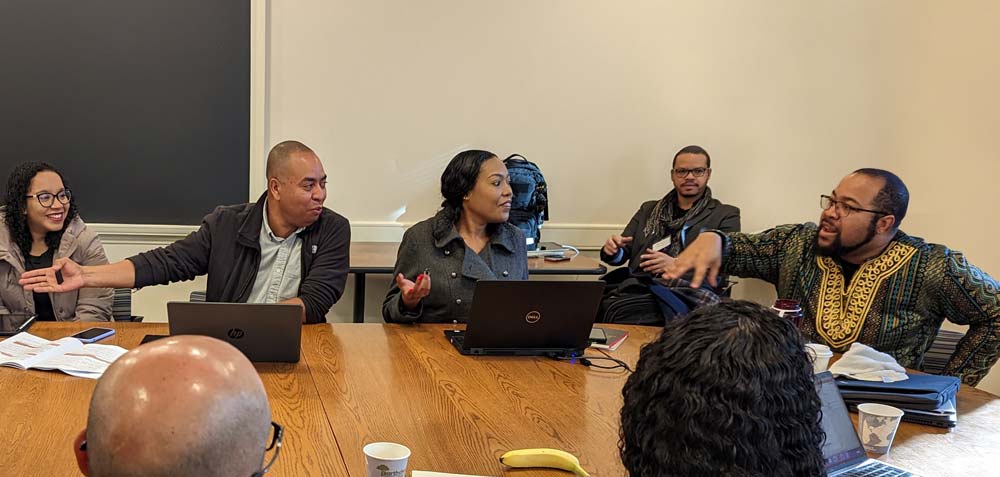Book Manuscripts
Analysis of the Virtual Survey of the Afro-Peruvian Youth—Citizen Participation and Effects of COVID-19 (in progress)
This survey was conducted in cooperation with the Lima-based Center for Ethnic Development (CEDET) from March to May 2021. Serving as the lead investigator, I supervised a team of two undergraduate students affiliated with CEDET to conduct the research. The study was a convenience sample of 440 young adults aged 18-30 from across Peru, which included two rounds of quantitative surveys and oversampling of Afro-Peruvians. Thirty-five Afro-Peruvian participants were selected for in-depth interviews. Public opinion polling in Peru rarely provides disaggregation by racial or ethnic origin, and scholars in Peru have largely ignored the political attitudes of Afro-Peruvians. This research helps complicate the understanding of Afro-Peruvian political behavior and challenges the narrative that the Afro-Peruvian identity is cultural and has little bearing on political behavior.
Black Politics in Peru and Ecuador, 1980-2016: Social Movements and State Response (in progress)
Using a paired case study of the early 21st century Black movements in Peru and Ecuador, I argue that the Black mobilization in these countries can be explained through a series of internal and external processes combining the emergence of a domestic Black political identity with transnational networks and material resources. In this time period, a plethora of Black organizations emerged, thrusting race-based grievances into the national political space with various demands from the constitutional recognition of Black populations to economic development for Black communities. I analyze state response by looking at the presence of the following indicators: 1) public policies targeted towards the Black population; 2) state institutions established specifically to aid the Black population; and 3) constitutional and legal reforms advocated by Black activists. I conducted field research in both countries from 2004-2016 in various site visits ranging from several weeks to one year using several qualitative techniques to construct the case studies.
Peer Reviewed
- John Thomas III and Eshe Lewis. 2020. «Me Gritaron Negra»: Surgimiento y desarrollo del Movimiento de Mujeres Afrodescendientes en el Perú (1980-2015). Investigaciones Sociales. 44. 188-199.
- Eshe Lewis and John Thomas III. 2019. “Me Gritaron Negra”: The emergence and development of the Afro-descendant women’s movement in Peru (1980-2015). Journal of International Women’s Studies, 20(8), 18-39.
Book Reviews
- John Thomas III. forthcoming. Review of the book The Politics of Being Afro-Latino/Latina: Ethnicity,
Colorism, and Political Representation in Washington, D.C. by Isreal Mallard. National Review of Black Politics, Vol. 4, Issue 1, pp.xx-xx. - Thomas, John III (2021). [Review of the book Promoting Democracy: The Force of Political Settlements in Uncertain Times, by Manal A. Jamal]. National Review of Black Policitics. January 2021. 63-65.
- Thomas, John III (2020). [Review of the book Occupying Schools, Occupying Land: How the Landless Workers Movement
- Transformed Brazilian Education by Rebecca Tarlau]. Mobilization 20 (4). 535-536.
Conference Proceedings
- John Thomas III. 2020. “Interpretando el ser político afroperuano a través del Censo 2017.” In Los Afrodescendientes en las Américas: 200 años de Vida Republicana, Ciudadanías Incompletas. Lima: CEDET, Centro de Desarrollo Étnico.
- John Thomas III. 2013. “Etnicidad y nacionalismo en estados multiétnicos desde la perspectiva negra en América Latina.” In Presencia y persistencia: paradigmas culturales de los afrodescendiente., Caja negra; eds. Lilia Mayorga Balcázar and Margarita Ramírez Mazzetti. Lima: Centro de Desarrollo Étnicos – CEDET.
- John Thomas III. 2010. “El movimiento hacia los derechos civiles de la población afrodescendiente en los Estados Unidos.” In La libertad inconclusa: entorno a la esclavitud, su abolición y los derechos civiles., Serie Caja negra; ed. CEDET. Lima: CEDET, Centro de Desarrollo Étnico.
Reports
John Thomas III 2011. Diagnóstico del Contexto de las poblaciones afroperuanas. Inter-American Development Bank: Washington, DC.
Working Papers
- Generational Divides in Latino/a Attitudes towards Immigrants: Lessons from Texas (under review)
- La importancia de HBCUs para el pueblo afro en las America (preparing for submission Spring 2024)
- Afro-descendants, Populism and Authoritarianism in Latin America: It’s Complicated (preparing for submission Spring 2024)
Dissertation
Black Politics in Peru and Ecuador, 1980-2016
From 1970 to the present, Afro-Latino (or “Black”) movements have emerged in every country from the Rio Grande to Tierra del Fuego with an African descendant population. Black mobilization in Latin America centers on the denial of Afro-visibility and full participation in the life of the nation-state since emancipation. In a region known already for its high levels of socioeconomic inequality, Blacks and indigenous persons bear the brunt of these disparities. As a corrective to the current theoretical invisibility of Latin American Black social movements, this project answers the following questions: 1) How did Black movements in Peru and Ecuador emerge?; 2) How have they impacted the “political landscape” of their states? While the movements have succeeded in challenging the invisibility of Afro-descendants by their states, the broader impacts of the movements on the state (i.e. bureaucracy, electoral participation, legal regime) remain to be analyzed. Using a paired case study of the Black movements in Peru and Ecuador from 1980 to 2016, I explain the emergence of these movements as a form of Black politics and the ways in which these movements impacted their states. This project broadens the theoretical understanding of ethnic mobilization in Latin America by evaluating how existing theories of ethnic mobilization explain the mobilization of Black activists in Peru and Ecuador.
